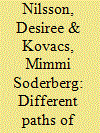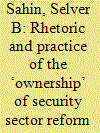| Srl | Item |
| 1 |
ID:
119280


|
|
|
|
|
| Publication |
2013.
|
| Summary/Abstract |
Security Sector Reform (SSR) has developed into a key component of international peacebuilding agendas. However, there is a lack of sufficient knowledge of the advantages and drawbacks of different reform processes. This study offers a comparative analysis of two post-war states with diverse approaches to the reconstruction of the national armed forces after a civil war: Sierra Leone after the 1999 Lomé Peace Accord, where the competing warring parties were integrated into a single force; and Liberia following the 2003 Accra Peace Agreement, where the old army was disbanded and a new force was recruited and built from scratch. The findings show that each approach was associated with distinct benefits and risks during the implementation process. However, the outcomes are also similar in many important respects, and raise questions about the long-term sustainability of these reforms.
|
|
|
|
|
|
|
|
|
|
|
|
|
|
|
|
| 2 |
ID:
153530


|
|
|
|
|
| Summary/Abstract |
Successful outcomes in security sector reform (SSR) implementation are often conditioned on two key inter-related operational principles: international agencies’ understanding of the ‘local context’ where they intervene and their encouragement of the country ‘ownership’ of the institutional reforms they advocate. Outcomes, however, are determined by power, and different patterns of outcomes are likely to emerge from different types and degrees of power exercised by a multiplicity of actors operating in a dynamic political and social context. Drawing upon these inter-connections between outcomes and power, this article examines Kosovo’s security sector development experience since 1999. It argues that depending on types of, and changes in, power-based interplays between international and domestic forces, different patterns of ‘ownership’ have emerged in the context of SSR implementation in Kosovo.
|
|
|
|
|
|
|
|
|
|
|
|
|
|
|
|